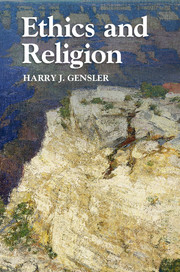2 - Divine Command Theory
from PART I - ETHICS AS GOD'S COMMANDS
Published online by Cambridge University Press: 05 May 2016
Summary
Is God the source of morality, so without God, we couldn't have genuine duties? This is a burning issue for philosophers and nonphilosophers alike. Politicians, preachers, and parents often insist that the very existence of society requires the strong moral values that only religion and religious moral education can provide. Atheists protest that they're misunderstood and discriminated against and can be as moral as believers.
This chapter considers the traditional divine command theory (DCT), which sees genuine duties as depending on God's will; I'll introduce DCT using C. S. Lewis's somewhat similar view. Chapter 3 discusses modified DCTs that assert a qualified dependence of morality on God's will.
C. S. Lewis
Clive Staples Lewis (1898–1963) was born in Belfast. He taught medieval and Renaissance literature for thirty years at Oxford and then ten more at Cambridge. He became famous for his children's books and Christian apologetics. His books sold 100 million copies and remain influential today; a show of hands in my logic course, with mostly philosophy graduate students, showed that most had read Lewis.
Lewis became an atheist as a teenager, driven by the problem of evil: “My argument against God was that the universe seemed so cruel and unjust” (Lewis 1952: 38). In midlife, he returned to God as an Anglican and came to defend “mere Christianity” (what Christian groups hold in common).
The BBC asked him to do radio talks about his faith. Lewis accepted, even though he saw himself as an amateur and beginner in religion; he thought that, as a layman and former atheist, he might have something special to say to people who struggle with faith. His classic apologetic work, Mere Christianity (Lewis 1952), came from earlier radio talks and sold 11 million copies. We'll focus on his “Right and Wrong: A Clue to the Meaning of the Universe.”
Lewis provides an ideal introduction for us because he's clear, insightful, entertaining, and influential – and avoids technical issues better discussed later.
Lewis (1952: 3–32) argues that there's an objective moral law and that this requires the existence of God.
First, Lewis contends that pretty much everyone recognizes objective moral duties. He defends this in various ways.
- Type
- Chapter
- Information
- Ethics and Religion , pp. 9 - 28Publisher: Cambridge University PressPrint publication year: 2016

